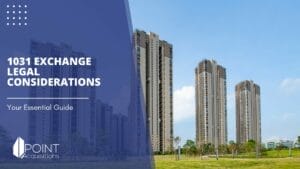
1031 Exchange: Converting Investment Property to Primary Residence
Investing in real estate can be lucrative, but circumstances may change, leading you to consider converting your investment property into your primary residence. While this process can have significant financial and lifestyle benefits, it’s essential to understand the concept of a 1031 exchange.
This post explores the ins and outs of a 1031 exchange for converting investment properties into primary residences. We’ll delve into how the IRS permits almost any exchange of qualified properties held for investment, making any investment property eligible for a “like-kind” swap with another.
Additionally, we’ll discuss the scenarios where circumstances change, allowing investment properties to evolve into primary residences or even vacation homes. Understanding the eligibility criteria and tax implications allows readers to make informed decisions and maximize the benefits of a 1031 exchange when converting their investment properties.

Table of Contents
When Does it Make Sense to Convert a 1031 Exchange Property?
Here are various situations where it might be beneficial to consider converting a 1031 exchange property into a primary residence. Here are some common scenarios:
- Unexpectedly losing your job: If you find yourself unemployed and need to downsize or reduce housing expenses, converting your investment property into your primary residence can be a viable option.
- Health reasons: If you or a family member require specialized medical care or accessibility accommodations, converting an investment property into a primary residence can provide the necessary living arrangements.
- Going through a divorce: Divorce often involves property division, and converting an investment property into a primary residence can help simplify the process and provide a stable living situation for one of the parties.
- Getting married: Combining households after marriage may require a larger living space. Converting an investment property into a primary residence can accommodate the changing needs of a growing family.
- Becoming a caretaker: If you need to care for an aging parent or a family member with special needs, converting your investment property into a primary residence can allow for proximity and ease of caregiving.
Documenting these reasons and keeping all relevant paperwork for IRS purposes is essential. While the IRS allows the conversion of an investment property into a primary residence through a 1031 exchange, you must still demonstrate that you initially acquired the property for rental or investment purposes.
By understanding the circumstances that make converting a 1031 exchange property a sensible choice and ensuring compliance with IRS requirements, individuals can make informed decisions regarding their real estate investments and benefit from the tax advantages offered by a 1031 exchange.

What are the Rules for Converting Investment Property to a Primary Residence or Vacation Home?
Converting an investment property into a primary residence or a vacation home involves specific rules and considerations. Here are the key regulations to keep in mind:
Proof of Intent
When converting a property, you must provide proof that you initially acquired the property intending to use it for rental or investment purposes. This proof can include documents such as rental agreements, advertising listings, or financial statements.
What if I Can’t Prove Intent?
If you cannot provide sufficient proof of intent to use the property as a rental or investment property, it may impact your ability to convert it into a primary residence or vacation home. In such cases, consulting with a tax professional or attorney who can explore alternative options or strategies to help you achieve your desired outcome while remaining compliant with IRS regulations is advisable.
Property Must be Retained as a Rental Unit
The property must be held as a rental unit for a specific period to be eligible for conversion. The general guideline is to own and rent the property for at least 24 months before considering conversion.
Property Must be Rented at Least 14 days During One of the Two Years
During the 24 months, the property must be rented out for at least 14 days or more. This requirement ensures that the property retains its status as an investment property.
Personal Use of the Property Must Not Exceed Either 14 Days or 10%
As the property owner, your personal use of the property should be limited. It should not exceed either 14 days or 10% of the total number of days the property is rented out during the 24 months.
Once the 24 Months Conclude, You Can Move into the Property and Declare it a Primary Residence
After fulfilling the 24-month requirement, you can move into the property and declare it your primary residence or a vacation home. This transition allows you to enjoy the property while receiving the associated tax benefits.
Applicable only to Single Owner Properties
It’s important to note that the rules for converting investment property to a primary residence or vacation home apply specifically to properties owned by a single individual. Different rules may apply if multiple individuals or entities own the property.
If you cannot provide sufficient proof of intent or meet the eligibility criteria, consult a tax professional to explore alternative options or understand potential tax implications.
By adhering to these rules and requirements, property owners can successfully convert their investment properties into primary residences or vacation homes, enjoying the benefits of both personal use and potential tax advantages.

What Do I Need to Know Before Converting 1031 Exchange Property Into a Principal Residence
Before converting a 1031 exchange property into a principal residence, there are important considerations to keep in mind:
Do Not Create a Contingency
Avoid including any contingencies in the exchange agreement explicitly stating the intention to convert the property into a primary residence.
Do Not Begin Construction
Refrain from starting any construction or renovation on the property immediately after the exchange, as it may raise questions about the original intent of the exchange.
Document the Rent Price
If you continue to rent out the property during the required holding period, document the rent price and keep copies of lease agreements or rental records to demonstrate its use as an investment property.
Save Copies of Listings and Advertisements
Keep copies of listings, advertisements, or other relevant documents that show the property was actively marketed as a rental or investment property.
Do Not Move into the House Right After Closing
Ensure that you meet the required holding period before moving into the property as your principal residence.
Avoid Making Plans Drawn Up Too Early
Delay making specific plans or architectural drawings tailored for the property as a primary residence until after the required holding period.
Avoid Disclosing Plans to Move In
Refrain from disclosing your plans to move into the property as your principal residence to anyone involved in the exchange, including tenants, intermediaries, and buyers.
Document any Change of Circumstance
If any changes in circumstances may affect the property’s use or intended conversion, make sure to document them for future reference.
Save the Contact Information of Potential Tenants
Keep a record of the contact information of potential tenants or interested parties interested in renting the property during the holding period.
Ensure Permission for Rental
Confirm that renting the property is allowed and compliant with homeowners’ association rules, local ordinances, or lease agreements.
Following these guidelines can help you navigate converting a 1031 exchange property into a principal residence while complying with IRS regulations. It is advisable to consult with a tax professional or attorney to thoroughly understand the requirements and address any specific concerns related to your situation.

Can I Change My Mind After a 1031 Exchange?
Yes, changing your mind after a 1031 exchange is possible, but it would require undoing the exchange transaction. Once the exchange is completed, the exchanged property is subject to certain restrictions and holding periods. If you decide to reverse the exchange, you must consult with a tax professional or attorney to explore the options available and understand the potential tax consequences of undoing the exchange.
What are Common 1031 Exchange Mistakes?
Common 1031 exchange mistakes include:
- Waiting Too Long to Set up a 1031 Exchange: One common mistake is waiting until the last minute to initiate the 1031 exchange process. Start early to ensure sufficient time for property identification and compliance with the strict timelines set by the IRS.
- Believing 1031 Exchanges Eliminate Tax: It’s a misconception that 1031 exchanges eliminate tax obligations. While the exchange allows for the deferral of taxes, capital gains taxes may still be due upon the sale of the replacement property if it’s not further exchanged.
- Improper Planning or Lack of Understanding: Inadequate planning or understanding of the rules and requirements can lead to mistakes. Working with a qualified intermediary or tax professional who can guide you through the process and ensure compliance is crucial.
- Not Identifying a Replacement Property in Time: Failure to identify a suitable replacement property within the 45-day identification period can result in the disqualification of the 1031 exchange. It’s important to carefully research and identify potential replacement properties within the specified timeframe.
Avoiding these common mistakes is crucial to navigating a successful 1031 exchange. If you have questions about your property’s eligibility for a 1031 exchange or need assistance with your real estate investment strategies, contact us at Point Acquisitions. Our team can guide you in the right direction and connect you with experts who specialize in 1031 exchanges and can provide the guidance and support you need to make informed decisions. Take advantage of the potential benefits of a 1031 exchange and reach out to Point Acquisitions today.
About The Author

Jesse Shemesh
Disclaimer
Please note that Point Acquisitions is not a tax expert or tax advisor. The information on our blogs and pages is for general informational purposes only and should not be relied upon as legal, tax, or accounting advice. Any information provided does not constitute professional advice or create an attorney-client or any other professional relationship. We recommend that you consult with your tax advisor or seek professional advice before making any decisions based on the information provided on our blogs and pages. Point Acquisitions is not responsible for any actions taken based on the information provided on our blogs and pages.
1031 Exchange Capital Gains Tax Deferral
According to a 2021 report by the National Real Estate Exchange Services (RES), over 240,000 1031 exchange transactions were completed in the United States, totaling $100 billion. This impressive figure underscores the role of 1031 exchanges in the real estate…
Read More1031 Exchange Benefits
As of Q4 2023, the national vacancy rate for all commercial property types in the United States sat at 9.2%, according to CBRE’s latest insights and research. This represents a slight decrease compared to the previous quarter and suggests a…
Read More1031 Exchange Legal Considerations: A Must-Read Guide
You’re in the right place if you’re considering a 1031 exchange for your commercial real estate investments. Whether you’re a seasoned investor or just dipping your toes into the market, understanding the legal landscape of 1031 exchanges is key to…
Read More

